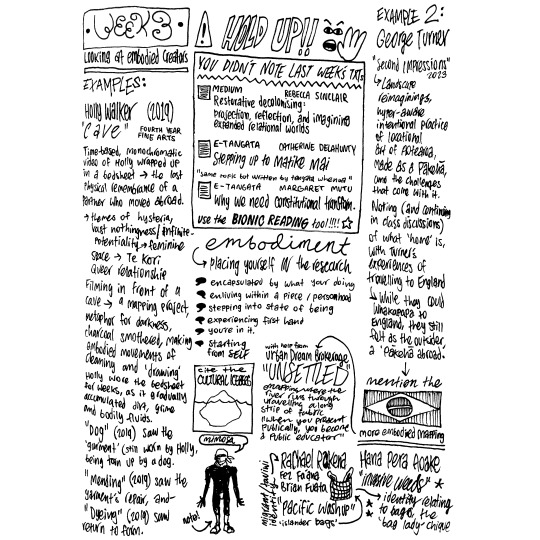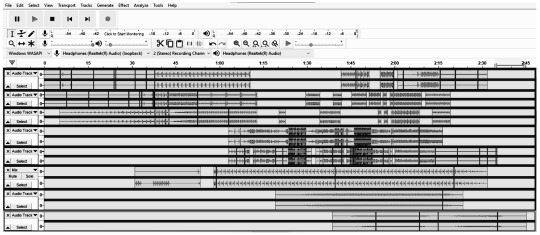Text
✷ 𝓦𝓔𝓔𝓚 4 - 𝓢𝓱𝓸𝔀 𝓪𝓷𝓭 𝓽𝓮𝓵𝓵
𝒞𝓵𝓪𝓼𝓼 𝓷𝓸𝓽𝓮𝓼 ✶
reframing history with context of the writers
last week we were assigned to read Historian As Curandera by Aurora Levins Morales, few of us actually did, me included, so we did that today.
"History is the story we tell ourselves about how the past explains our present, and the ways we tell it are shaped by contemporary needs." (Morales 71)
Holly brought forth the discussion of memory repression, citing a (depressing) example from The Body Keeps the Score
The article Historian As Curandera provides a historical 'handibook' for writing, reframing and empowering history, through 15 s
1 . T E L L U N T O L D O R U N D E R T O L D
H I S T O R I E S .
2 . C E N T E R I N G W
O M E N C H A N G E S T H E
L A N D S C A P E .
3 . I D E N T I F Y S T R A T E G I C P I E C E S
O F M I S I N F O R M A T I O N A N D
C O N T R A D I C T T H E M .
4 . M A K E A B S E N C E S V I S I
B
L E .
5 . A S K I N G Q U E S T I O N S C A N B E A S
G O O D A S A N S W E R I N G T H E M .
6 . W H A T C O N S T I T U T E S E V I D E N C E ?
7 . S H O W A G E N C Y .
8 . S H O W C O M P L E X I T Y A N D E M B R A C E
A M B I G U I T Y A N D C O N T R A D I C T I O N .
9 . R E V E A L H I D D E N P O W E R
R E L A T I O N S H I P S .
1 0 . P E R S O N A L I Z E .
1 1 . S H O W C O N N E C T I O N A N D C O N T E X T .
1 2 . R E S T O R E G L O B A L M E A N I N G .
1 3 . P R O V I D E A C C E S S A N D
D I G E S T I B I L I T Y .
1 4 . S H O W Y O U R S E L F I N Y O U R W O R K .
1 5 . C R O S S B O R D E R S .
thing I said in class that I'm proud of - colonial society has instilled a complacency in discussive awareness towards the white cis man.
'lot of hot takes tend to come from that demographic'
defensiveness, deep-set egocentrism, the podcast archetype
class notes - "non-academic ways of communicating knowlege" - recreation of board
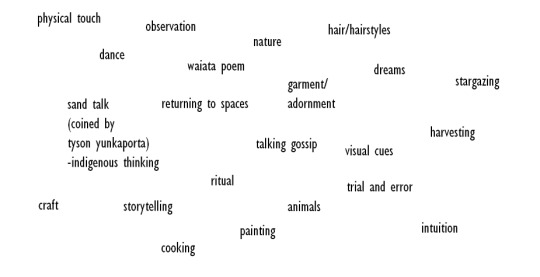
show and tell prompts:
brought in the piece of paper mum gave me
how was this object made?
whose was it originally? who owned it first
old or new?
how did you receive it?
ethics behind owning it?
how do you feel owning it?
could you recreate the object today? who do you need help from?
how does it impact your life?
what will happen to it when you die?
what did the group learn about you?
(paraphrasing answers from group presentation)
0 notes
Text
✷ 𝓦𝓔𝓔𝓚 2 - 𝓣𝓪𝓷𝓰𝓪𝓽𝓪 𝓣𝓲𝓻𝓲𝓽𝓲, 𝓜ā𝓸𝓻𝓲, 𝓣𝓪𝓾𝓲𝔀𝓲 𝓪𝓷𝓭 𝓟ā𝓴𝓮𝓱ā
𝒞𝓵𝓪𝓼𝓼 𝓷𝓸𝓽𝓮𝓼 ✶
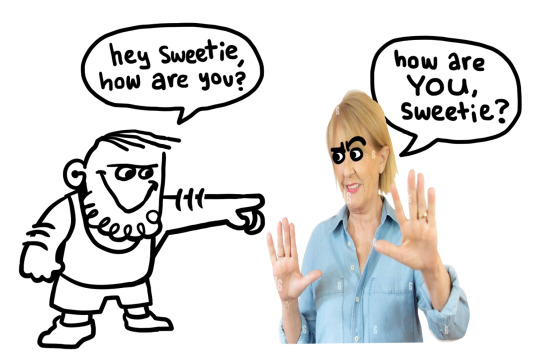
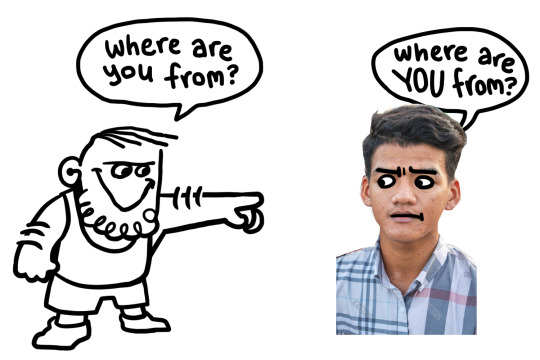
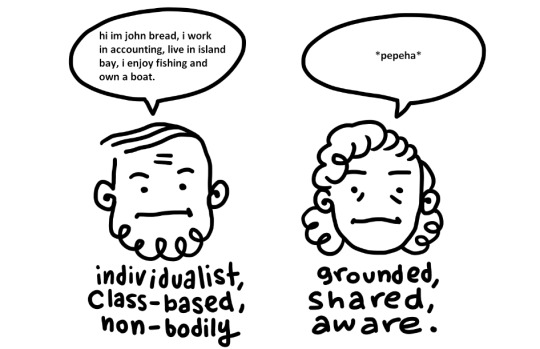
𝓓𝓮𝓿𝓮𝓵𝓸𝓹𝓶𝓮𝓷𝓽 ✶
youtube
youtube
youtube
0 notes
Text
✷ 𝓦𝓔𝓔𝓚 1 - 𝓟𝓸𝓼𝓲𝓽𝓲𝓸𝓷𝓪𝓵𝓲𝓽𝔂
𝒞𝓵𝓪𝓼𝓼 𝓷𝓸𝓽𝓮𝓼 ✶
Introductions! Our lecturer Holly Walker is a queer Pākehā creator, making conscious photographic works discussing the personal joys of being, all within the wider overhangs of colonial identity.
She also gets naked a fair bit for her mahi toi. Why? It's all about Embodied Practice - creatively tapping into the unconscious mind.
And as for the introductions of mine and others, we had these nifty forms to fill out and reflect on:
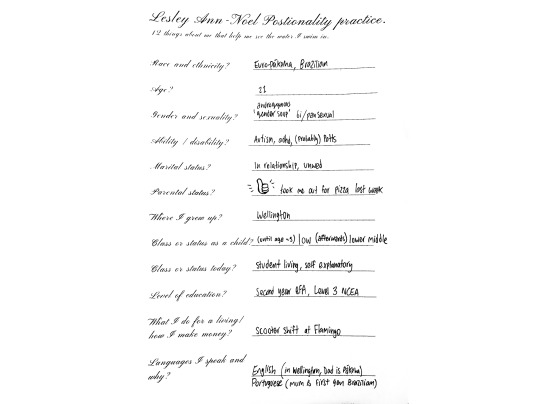
This first week sees the 'theme' of Positionality, a definition which, due to its breadth, Holly mapped out on the whiteboard as per classmate contributions.
Positionality for the individual - and this is an overall lumping of the many additions to the map - comes from experiences, physical expression, behaviors, privileges, relationships, trajectory, and history.
I was able to contribute with the 'trajectory' (or more accurately, timeline) suggestion, being the placement of self in one's life story, to plan in the long term, which is a reflection of one's privelege to even hold certainty to the future.
We then had a class exercise to identify the ingrained characteristics inherited from dominant systems of oppression - preceded by identifying Western Dualism - the binary of one against the other; this vs that. This is the first of an expansive sphere of ongoing colonial practices, habits and traces to be outlined in this class.
Holly presented a lengthy list of colonial legacies, to which we identified what affected us. They were subdivided into white supremacist, settler-colonial, hetero patriarchal, and class-elite behaviors; all wholly shaped by the mechanisms of colonialism.
Identifying mine became a 'fun' little game of figuring out where the autism ended and the colonialism began.
Perfectionism: It's a common trait shared in artists and autists alike - and I always assumed mine came from autism. A further chat with Holly helped specific the nasty sides of it - perfectionism is dangerous when you're holding others to your standard.
Individualism: This one I could hold more accountability towards. I compare myself to others a LOT, and a lot of my desire to 'succeed' (itself a colonial hallmark) comes from a selfish one-upmanship.
Objectivity: The idea that something is, because it is. 'Objectivity' is undisclosed subjectivity, built upon the dogmatic adherence to assumption, and goodness ME it's been a challenge these past five years to begin thinking critically.
Controlling/Micromanaging: While intrinsically linked to perfectionism, I can better identify my personal traits of such. Micromanaging is anti-collaborative, anti-community and deeply individualistic - of which 'my' standard can only be attained if 'I' take control, it's a slippery slope of elitism, which ALSO is another colonial trait.
𝓡𝓮𝓪𝓭𝓲𝓷𝓰𝓼 ✶
This week please start recording and contemplating the mapping and locating provocation in the brief. Spend time in your environment learning names, recording discoveries new to you about your location; refer to the brief to get you started. Start researching and considering ways in which you could visually represent your relationship to your location and what you are learning.
Catherine Delahunty - Becoming Tangata Tiriti
Delahunty outlines an experience at their first hui at a marae years prior - during which when it came to to introduce herself, presented herself as a "Pākehā mongrel", with ancestry in the 'British Isles'.
There is a lack of connection, which many Pākehā folk - myself included - can share to these origins.
"Usually, this ignorance isn’t uncomfortable, unless I’m on a marae or at a hui where, in effect, we’re challenged to bring our ancestors."
The general Pākehā ignorance towards ancestry stands against the the embedded tikanga of strong familial and ancestral connection in Māori community.
"In a sense, when the rest of us don’t know or don’t care about our own people’s past, it’s a way of demeaning or denying Māori their essence as Māori and, by extension, their rights as Māori. It’s as if whakapapa has no value.
"In te ao Māori, you walk into the future while looking to the past, but many of us Pākehā have been raised to think the past is way behind us in that place we call the mists of time. "
So Delahunty, eyes fixed on the past, followed her ancestral "scraps" to Ireland and Scotland - both sharing an experience all too familiar of English terror, of a devastating genocide, of stripped rights and a shrunken tongue.
"The Highlands and the west of Ireland were a brief and gorgeous story for me, but, although it was ancestry, it wasn’t home."
The coloniser is still the coloniser - she could trace, with some broad stroke, her ancestral past in those lands, but here, she is tauiwi, and can neither claim her maunga, awa, moana or whatnot here - or back there - the experience is not hers to share; an not worth feeling sorry for, either.
"So, renaming places and claiming other ancestral relationships hasn’t felt right to me."
Delhunty ends the article with claims of her own - one of being Pākehā and tangata tiriti. To live here, but not assert herself - it's a complex and heavy introduction with generations of baggage and I won't even bother with concluding it.
RNZ -Land of the Long White Cloud | Episode 2: Inheriting Privilege
Jen Margaret - "As Pākehā, we don't have the tools to understand the 'now', as we don't understand our history"
Personal, Pākehā conflict of history - "...wanting it to be different than it really is"
Familial history of supporting Māori rights - her great great grandfather, for instance, was outspoken towards the representation of Māori in parliament; and on the flipside, was awarded two plots of Ngāi Tahu land for winning a race - the very land that the people he was supporting were fighting for.
Narratives - "...what I was needing/wanting my ancestors to be."
"Obviously I do stuff because I want to shift our understanding as Pākeha and our work to honor Te Tiriti. But within that, I don't step out of my Pākehā privelege."
0 notes
